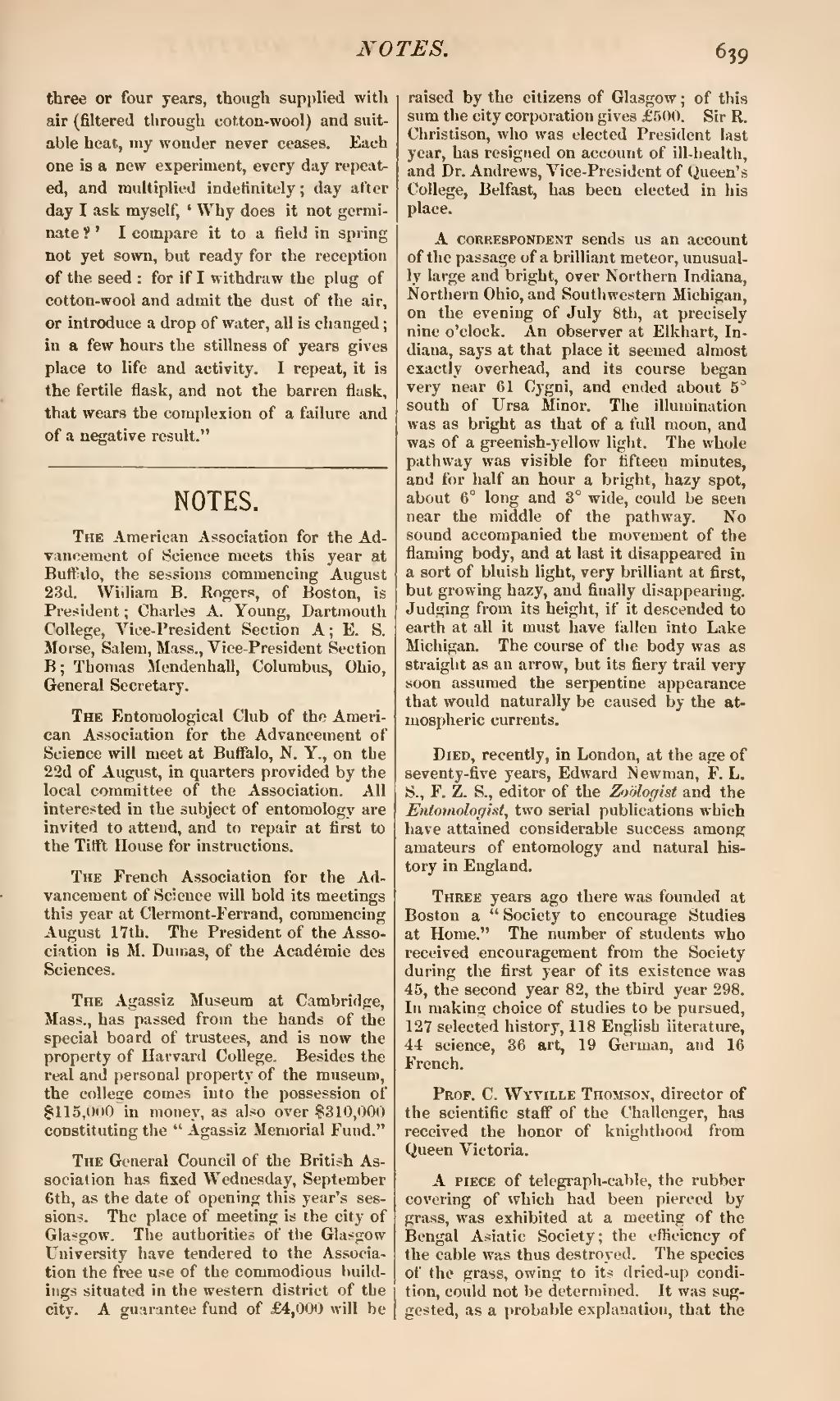three or four years, though supplied with air (filtered through cotton-wool) and suitable heat, my wonder never ceases. Each one is a new experiment, every day repeated, and multiplied indefinitely; day after day I ask myself, 'Why does it not germinate?' I compare it to a field in spring not yet sown, but ready for the reception of the. seed: for if I withdraw the plug of cotton-wool and admit the dust of the air, or introduce a drop of water, all is changed; in a few hours the stillness of years gives place to life and activity. I repeat, it is the fertile flask, and not the barren flask, that wears the complexion of a failure and of a negative result."
The American Association for the Advancement of Science meets this year at Buffalo, the sessions commencing August 23d. William B. Rogers, of Boston, is President; Charles A. Young, Dartmouth College, Vice-President Section A; E. S. Morse, Salem, Mass., Vice-President Section B; Thomas Mendenhall, Columbus, Ohio, General Secretary.
The Entomological Club of the American Association for the Advancement of Science will meet at Buffalo, N. Y., on the 22d of August, in quarters provided by the local committee of the Association. All interested in the subject of entomology are invited to attend, and to repair at first to the Tuft House for instructions.
The French Association for the Advancement of Science will hold its meetings this year at Clermont-Ferrand, commencing August 17th. The President of the Association is M. Dumas, of the Académie des Sciences.
The Agassiz Museum at Cambridge, Mass., has passed from the hands of the special board of trustees, and is now the property of Harvard College. Besides the real and personal property of the museum, the college comes into the possession of $115,000 in money, as also over $310,000 constituting the "Agassiz Memorial Fund."
The General Council of the British Association has fixed Wednesday, September 6th, as the date of opening this year's sessions. The place of meeting is the city of Glasgow. The authorities of the Glasgow University have tendered to the Association the free use of the commodious buildings situated in the western district of the city. A guarantee fund of £4,000 will be raised by the citizens of Glasgow; of this sum the city corporation gives £500. Sir R. Christison, who was elected President last year, has resigned on account of ill-health, and Dr. Andrews, Vice-President of Queen's College, Belfast, has been elected in his place.
A correspondent sends us an account of the passage of a brilliant meteor, unusually large and bright, over Northern Indiana, Northern Ohio, and Southwestern Michigan, on the evening of July 8th, at precisely nine o'clock. An observer at Elkhart, Indiana, says at that place it seemed almost exactly overhead, and its course began very near 61 Cygni, and ended about 5° south of Ursa Minor. The illumination was as bright as that of a full moon, and was of a greenish-yellow light. The whole pathway was visible for fifteen minutes, and for half an hour a bright, hazy spot, about 6° long and 3° wide, could be seen near the middle of the pathway. No sound accompanied the movement of the flaming body, and at last it disappeared in a sort of bluish light, very brilliant at first, but growing hazy, and finally disappearing. Judging from its height, if it descended to earth at all it must have fallen into Lake Michigan. The course of the body was as straight as an arrow, but its fiery trail very soon assumed the serpentine appearance that would naturally be caused by the atmospheric currents.
Died, recently, in London, at the age of seventy-five years, Edward Newman, F.L.S., F.Z.S., editor of the Zoölogist and the Entomologist, two serial publications which have attained considerable success among amateurs of entomology and natural history in England.
Three years ago there was founded at Boston a "Society to encourage Studies at Home." The number of students who received encouragement from the Society during the first year of its existence was 45, the second year 82, the third year 298. In making choice of studies to be pursued, 127 selected history, 118 English literature, 44 science, 36 art, 19 German, and 16 French.
Prof. C. Wyville Thomson, director of the scientific staff of the Challenger, has received the honor of knighthood from Queen Victoria.
A piece of telegraph-cable, the rubber covering of which had been pierced by grass, was exhibited at a meeting of the Bengal Asiatic Society; the efficiency of the cable was thus destroyed. The species of the grass, owing to its dried up condition, could not be determined. It was suggested, as a probable explanation, that the

